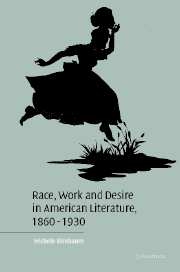Book contents
- Frontmatter
- Contents
- List of illustrations
- Acknowledgments
- Introduction: working relations and racial desire
- 1 Dressing down the First Lady: Elizabeth Keckley's Behind The Scenes, Or Thirty Years A Slave And Four Years In The White House
- 2 Off-color patients in Frances E. W. Harper's Iola Leroy and W. D. Howells's An Imperative Duty
- 3 “Alien hands” in Kate Chopin's The Awakening
- 4 “For blood that is not yours”: Langston Hughes and the art of patronage
- Epilogue: “co-workers in the kingdom of culture”
- Notes
- Index
Epilogue: “co-workers in the kingdom of culture”
Published online by Cambridge University Press: 07 December 2009
- Frontmatter
- Contents
- List of illustrations
- Acknowledgments
- Introduction: working relations and racial desire
- 1 Dressing down the First Lady: Elizabeth Keckley's Behind The Scenes, Or Thirty Years A Slave And Four Years In The White House
- 2 Off-color patients in Frances E. W. Harper's Iola Leroy and W. D. Howells's An Imperative Duty
- 3 “Alien hands” in Kate Chopin's The Awakening
- 4 “For blood that is not yours”: Langston Hughes and the art of patronage
- Epilogue: “co-workers in the kingdom of culture”
- Notes
- Index
Summary
This, then, is the end of [the American Negro's] striving: to be a co-worker in the kingdom of culture.
W. E. B. Du Bois, “Of Our Spiritual Strivings”How do we negotiate between my history and yours? How would it be possible for us to recover our commonality, not the ambiguous imperial-humanist myth of those shared human (and indeed almost divine) attributes that are supposed to distinguish us absolutely from animals but, more significant, the imbrication of our various pasts and presents, the ineluctable relationships of shared and contested meanings, values, material resources? It is necessary to assert our dense particularities, our lived and imagined differences; but can we afford to leave untheorized the question of how our differences are intertwined and, indeed, hierarchically organized? Could we, in other words, afford to have entirely different histories, to see ourselves as living – and having lived – in entirely heterogeneous and discrete spaces?
Satya P. Mohanty, Literary Theory and the Claims of History… we'll pretend the people cannot see you. That is, the citizens. And that you are free of your own history. And I am free of my history. We'll pretend that we are both anonymous beauties smashing along through the city's entrails.
Lula to Clay in Amiri Baraka's DutchmanANONYMOUS BEAUTIES
At the outset of this book, I suggest that we inquire into the centripetal as well as centrifugal forces of racial desire in literary representation, and respond to Kara Walker's marvelous query about how certain images can contain “all the secrets of the re-enactment of history in the arena of Desire.”
- Type
- Chapter
- Information
- Race, Work, and Desire in American Literature, 1860–1930 , pp. 146 - 151Publisher: Cambridge University PressPrint publication year: 2003



